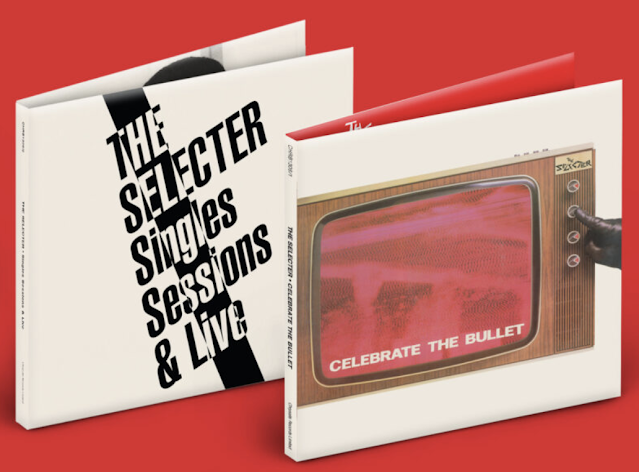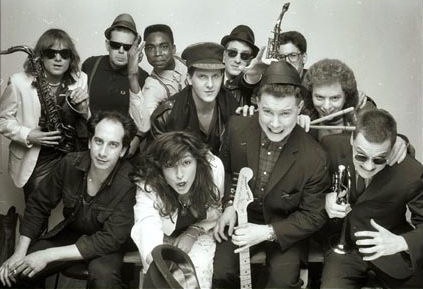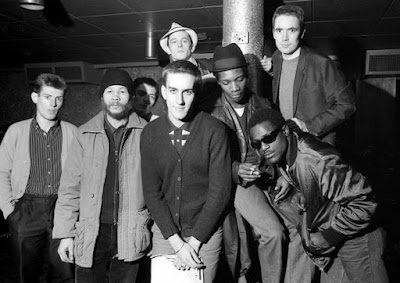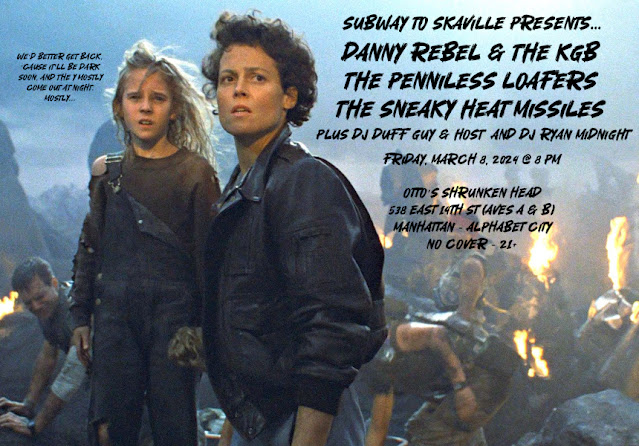Monday, May 6, 2024
Wednesday, March 6, 2024
Wednesday, January 10, 2024
Thursday, December 7, 2023
Subway to Skaville presents Cenzo, The Sunshine Melodies, Threat Level Burgundy, plus DJs Ryan Midnight and Duff Guy at Otto's Shrunken Head This Friday Night!
I'm spinning the best in ska, reggae, new wave, and post-punk this Friday night from 8 p.m. to midnight at Otto's Shrunken Head Tiki Bar in Alphabet City (Manhattan)!
(Apologies to Godzilla and Hedorah.)
+ + + +
Also, here are the flyers I created for some other nights I've DJ'ed there recently...
Thursday, May 18, 2023
Sunday, February 5, 2023
Duff Review: The Selecter "Deepwater" (Single Version) from the 40th-Anniversary Deluxe CD Reissue of "Celebrate the Bullet" (Chrysalis Records)
 (Review by Steve Shafer)
(Review by Steve Shafer)
I've written a fair amount about The Selecter's brilliant but unfairly maligned second record, Celebrate the Bullet (read my appreciation of the album and my interview about it with Selecter guitarist/songwriter Neol Davies first published in my book The Duff Guide to 2 Tone). So, I didn't expect to have too much more to add to the (late to the game) 40th-anniversary release of Celebrate the Bullet, which has been remastered and issued on heavyweight, clear vinyl and as an expanded triple-CD deluxe version (which contains a 20-page booklet with new liner notes from the band; the unreleased "Deepwater" single and its version; the Celebrate the Bullet BBC sessions from 1980; and an unreleased live concert recorded at Birmingham's NEC in 1980).
Both editions sound fantastic and are worth picking up--particularly if your old LP or cassette copy of Celebrate the Bullet has seen better days (or some misguided review put you off buying it in the first place). But the Rarities disk in the CD box set features a real gem--a previously unreleased take on Pauline Black's track "Deepwater" recorded with The Jam's producer Pete Wilson in April 1981. The intent was to issue it as the record's second single, but Radio 1's ludicrous ban on the "Celebrate the Bullet" single obliterated sales of the album, which quashed any thoughts of releasing a second single. ("Celebrate the Bullet" is an anti-gun/violence song, for Pete's sake--shouldn't Radio 1 have played that in the wake of John Lennon's murder and the shooting of President Reagan?)
As Neol Davies explains in the liner notes: "Even though disco had become unfashionable, I felt that dance music was about to re-emerge in a different form. We tried a new arrangement, keeping a mix of rapidly changing styles of pop music at the time in mind." And in 1981, that new style of pop music in the UK was driven by the New Romantics and synthpop. While it seems shocking to characterize it this way, the re-recorded take of "Deepwater" sounds like Selecter-meets-Duran Duran (whose sound at that time was deeply indebted to Japan and their Quiet Life album and associated single "Life in Tokyo," produced by Giorgio Moroder). But when you consider the timing of Duran Duran's debut single--"Planet Earth" was released on February 2, 1981, and skyrocketed to the #12 spot on the British charts by the end of that month--it all makes sense.
In an audacious move, the single version of "Deepwater" was refashioned with atmospheric synths, a disco bass line, Nile Rogers' Chic-era guitar work, and a Scary Monsters-influenced distorted/processed guitar solo (Davies was listening to Bowie's latest album at that time). As preposterous as this seems typed out on the screen, the results are super catchy and shimmeringly brilliant (and the altered chord progression and Black's vocal line during the "I never wanted to be in Deepwater again" lyric that leads into the chorus--is phenomenal!).
If you're listening Chrysalis Records, please consider releasing the single version of "Deepwater" and its instrumental remix on a vinyl 45 for an upcoming Record Store Day.
For a band attempting to figure out how to stay relevant in an ever-shifting pop landscape (and spark sales for a superb album that was tanking commercially), this radical departure might have worked had it been released--and permitted The Selecter to live on for a bit longer. It would have been fascinating to see what they might have done next, had they survived. Many diehard 2 Tone fans surely would have cried "sell-outs," but consider the musical paths most of The Selecter's peers went down within a year or two. Later in '81, Fun Boy Three split from The Specials (right after the triumph of "Ghost Town"!) to make minimalist African rhythm-driven new wave pop. Madness were releasing increasingly pop-filled albums (with hit singles like "It Must Be Love" and "Our House"), and The Beat died so Dave Wakeling and Ranking Roger could play Motown new wave pop.
In her notes for this song, Pauline Black explains her motivation for writing "Deepwater": "Once we had been the big fish in a small pond, now we were an international band with four hit singles. I felt as if we were drowning in the big pond of the music industry, unable to set a course and direction in the wake of an onboard mutiny [the departure of Desmond Brown and Charley Anderson just as the band was starting to record Celebrate the Bullet]." How ironic it would have been if the "Deepwater" single had been released back in 1981 and turned the commercial tides for the better for Celebrate the Bullet...
+ + + +
Monday, January 30, 2023
Duff Guide NYC Ska Calendar #2 Winter 2023
 |
| The Toasters, circa 1986 |
Thursday, February 2, 2023 @ 8:00 pm
Top Shotta Band featuring Screechy Dan, Stop the Presses, Max Glazer, Ayanna Heaven, Uproot Andy, Snips & Khalil, plus DJs Mush1 (Al Paragus Int'l)
Pianos
158 Ludlow Street
Manhattan, NY
+ + + +
Friday, February 10, 2023 @ 8:00 pm
Subway to Skaville presents: The Pomps (from Massachusetts), Barbicide (ex-Mephiskapheles, local heroes), Not From Concentrate (from Staten Island), Jo Mercado, plus DJs Yana Lil Jerk & Ryan Midnight
Otto's Shrunken Head
538 East 14th Street (between Avenues A & B)
Manhattan, NY
No cover (but bring cash the band tip bucket!)
(Sign up for the Subway to Skaville mailing list to receive info on future shows!)
+ + + +
Saturday, March 4, 2023 @ 7:00 pm
Cover Your Idols, The Mikey Erg! Band, Across the Aisle (Reunion!), My So Called Mixtape
Lucky 13 Saloon
644 Sackett Street
Brooklyn, NY
$13 (advanced tickets)/21+
+ + + +
Friday, March 31, 2023 @ 6:30 pm
The English Beat
Palladium Times Square
1515 Broadway
Manhattan, NY
$44.10/16+
+ + + +
Thursday, April 20, 2023 @ 8:00 pm
Mephiskapheles, Hub City Stompers, Butterbrain
The Bowery Electric
327 Bowery
Manhattan, NY
$16.90/21+
+ + + +
Monday, January 16, 2023
Duff NYC Ska Calendar #1 Winter 2023
Subway to Skaville presents:
Cenzo (from Boston, featuring members of Bim Skala Bim, Pilfers, and Spring Heeled Jack)
Drop Party (ska-funk from Connecticut)
Skappository (from Long Island
plus DJs Ryan Midnight & Duff Guy
Otto's Shrunken Head
538 East 14th Street (between Avenues A & B)
Manhattan, NY
No cover (but bring cash for the band tip bucket!)
Friday, February 10, 2023 @ 8:00 pm
Subway to Skaville presents:
The Pomps (from Massachusetts)
Barbicide (ex-Mephiskapheles, local heroes)
Not From Concentrate (from Staten Island)
Jo Mercado
plus DJs Yana Lil Jerk & Ryan Midnight
Otto's Shrunken Head
538 East 14th Street (between Avenues A & B)
Manhattan, NY
No cover (but bring cash the band tip bucket!)
+ + + +
Thursday, January 5, 2023
Duff Review: The Specials "Work In Progress Versions"
2 Tone/Chrysalis
2022
(Review by Steve Shafer)
Did you know there was a new Specials 10" single released in the UK this past November on Record Store Day? Neither did I.
I'm not sure how it slipped by without my noticing it. Last week, I was perusing the online 2 Tone Records shop and thinking about when to preorder the newly restored Dance Craze Blu-ray/DVD from BFI (British Film Institute), which for some odd reason isn't available in the US (though the triple-vinyl is). As I was scrolling through the goods (including some Dance Craze totes), I came across the recent 10" rarities from 2 Tone's vaults (see my reviews of Dub Mixes Exclusive and At The Home Organ: Demos 1980-82) and unexpectedly spied a new one: Work In Progress Versions!
This 10" contains The Specials' instrumental rehearsal version of (Terry Hall's composition) "Friday Night, Saturday Morning" and Jerry Dammers at the organ and Horace Panter on bass performing an early take of "I Can't Stand It." While it's probably not worth the casual fan's time to track this record down, diehard Specials followers will, of course, desperately need this in their collection.
Recorded in 1981, "Friday Night, Saturday Morning [Instrumental Rehearsal]" is a brighter, more upbeat version of this song with a shimmering guitar breezily wandering through the vocal line. It's fantastic and something you'll keep returning to. "I Can’t Stand It [Jerry Dammers at the Home Organ with Horace Panter on bass]," a demo recorded in 1980, is out there--and makes the final take of the song on More Specials seem pretty sedate in comparison. This is Dammers unleashed in exotica-land. He uses the familiar, preprogrammed Casiotone-like Latin percussion and many of the cheesier, Muzak-like synth tones on his Yamaha organ (check out his great solo during the bridge!). Ska purists will likely bristle at this (much as they did for side two of More Specials), but it's a fascinating glimpse of where Dammers' head was at during the recording of The Specials' second album. And I, for one, like it.
+ + + +
Considering how long it took to record the brilliant In the Studio (two years at a cost of half a million pounds!), there has to be unreleased Special AKA material to release in the future, right?
+ + + +
Monday, January 2, 2023
Remembering Terry Hall of The Specials
 |
| Terry Hall, center, with The Specials and Rico (Image: Coventry Telegraph) |
The news of Terry Hall's death on December 18 at age 63 from pancreatic cancer landed like a sucker punch to the gut--and I've been wrestling with how to process and write about it ever since. Several wonderfully insightful pieces about Hall's music and life already have been published--including Alexis Petridis' "Terry Hall was the self-assured eye of the Specials storm" in The Guardian and Neil Kulkarni's "Coventry & A Spirit Of Unbelonging: Terry Hall Remembered" in The Quietus. And Billy Bragg summed up Hall's and The Specials' impact so incredibly well in 280 characters. So, I'm not sure what I can add (but I need to add something).
As I write this, the terrible news of Pelé's death is just sinking in. I had seen him play at Giants Stadium in the Meadowlands in 1977 when I was 11, during his final season with the Cosmos. I've always considered it to be one of the highlights of my life, to have witnessed the greatest soccer player of all time in action, even if past his prime. While I'm reluctant to admit it, it's hitting me harder than Hall's passing--and forcing me to realize that I've always held Terry Hall at a bit of a distance, though I shouldn't be.
Even though he was the phenomenal, irreplaceable voice of my beloved Specials, Hall's dour and perpetually acerbic (though often bitingly funny) public persona left me cold. He was someone who could put anyone in their place with a quick, cutting remark. A man of few words, but they always hit their mark. I've always been wary of and felt at a disadvantage interacting with people this quick and sharp. (I have to mull things over--and often take longer than I'd like to admit to sort out the truth of a situation and articulate my thoughts.)
Having said all that and without ever having met him, I can immediately relate to several aspects of Hall's life and death. For several years after college, I worked as a caseworker at a residence for people with chronic mental illness (much later in his life, Hall was diagnosed as suffering from bipolar disorder). About five years ago, I witnessed a friend of mine--only a few months younger than me--undergo grueling treatment and slowly die from pancreatic cancer. And I've been a devoted fan of The Specials ever since first hearing "Ghost Town" in 1981.
Hall's detached and dispassionate vocals--often delivered standing stock still while the rest of the band exploded in furious motion behind him (as Petridis points out, see the closing credits of Dance Craze)--and fuck-all attitude made him the perfect frontman for The Specials, whose songs were mostly about how adults and their institutions had largely failed their generation. His disaffection with the world was not a pose. Growing up, he was subjected to one of the most horrific betrayals of adult trust imaginable.
At age 12, Hall was kidnapped by a teacher on a school trip in France and sexually abused by a pedophile ring for four days before being punched in the face and discarded on the side of a road. The trauma Hall suffered triggered a deep depression, whose treatment left him addicted to Valium for years and housebound for months (he also dropped out of school when he was 14). Hall also likely experienced emotional numbing--an unconscious psychological defense/survival mechanism common to people who have been severely traumatized where the brain attempts to lessen the pain by dampening all emotions (leaving someone who seems distanced, detached, and unfeeling).
It's not a stretch to argue that this abduction and sexual assault--in addition to his experience of growing up in a decaying, unfashionable Coventry in the 1970s (see Kulkarni's piece above)--lent Hall's voice and stage presence a unique authority and authenticity. In his alienation, cynicism, and emotional remove lay his power as he sang about everything around him--endemic racism and racial violence; working-class youth denied opportunity, purpose, even a satisfying night of fun by a government that didn't give a damn about their future; and the shared constant dread of all life being wiped out in a nuclear war. But his detachment didn't mean that Hall didn't care deeply about how the litany of society's unaddressed and intentionally aggravated ills was impacting Britain's youth. He was just clear-eyed about their plight. And everyone loved him for it.
Two of The Specials' greatest songs that bookend the original band's brief existence--Dammers' "Nite Klub" and Hall's own composition "Friday Night, Saturday Morning"--are both about the inability to take pleasure in a night out on the town. In "Nite Klub," Hall's deadpan delivery of the lyrics "I'm a parasite/I creep about at night" is spectacularly ambiguous. Is this meant to be sarcastic, commenting on the establishment's view of working-class youth on the dole? Or has the narrator internalized mainstream society's low opinion of him and his lot? And the suddenly released white-hot anger in the last line of this verse is devastating: "I don't work/'Cause I don't have to/I don't have to work/There's no, no work to do!" How can you have fun (or be a productive member of society, for that matter) when your life's going nowhere?
The narrator of "Nite Klub" is still hitting the nightspots a few years later in "Friday Night, Saturday Morning," but the piss and vinegar in his belly is gone. It's all now bleakly rote. Hall's unembellished singing conveys the track's boredom, futility, and despair extraordinarily well. But this portrait of Britain's forsaken youth is drawn with great empathy, not self-pity or anger at the powers that be (though Thatcher's the subtle target). And Hall's song contains one of the most universally relatable--and bluntly heartbreaking!--lyrics in pop music history: "Wish I had lipstick on my shirt/Instead of piss stains on my shoes."
In a 2019 interview with Richard Herring’s Leicester Square Theatre Podcast, Hall stated:
While there's much to unpack here (the forgiveness, his resilience), Hall's observation that child sexual abuse is "like part of life" is shocking. But considering what took place in the Catholic Church worldwide for decades--and god knows in how many other institutions that dealt with children--he's not wrong, is he?"I find it quite easy to forgive and forget. It’s like, you know, going back to my abduction, it’s like you can let that eat away at you but then well you know it’s paedophilia and it’s like part of life really."It’s unfortunate it happened to me but you can’t just let it destroy your life, it’s not good."
Clear-eyed to the end.
+ + + +
I offer my deepest condolences to Terry Hall's family, bandmates, friends, and fans.
+ + + +
(Updated on 1/3/2023 to include information on emotional numbing.)
+ + + +












